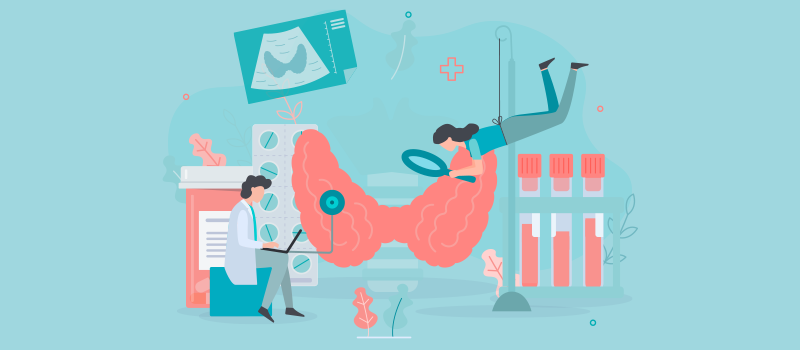What’s the Buzz
The Bee Healthy Blog
What is a Thyroid Storm? How Is It Treated?

A thyroid storm is a life-threatening condition and medical emergency that occurs due to thyroid hormone excess. During a thyroid storm, a person’s heart rate, blood pressure, and body temperature can rise to dangerous levels. Without prompt and aggressive treatment in an intensive care unit, thyroid storms can be fatal. Please continue reading to learn more about a thyroid storm and the treatment and supportive measures used for this serious condition.
Understanding the thyroid gland, thyroid hormones, and Graves disease
The thyroid gland is a small, butterfly-shaped structure located in front of the throat. It makes hormones called triiodothyronine (T3) and thyroxine (T4). These two hormones play a critical role in many important processes in the body, such as regulating body temperature, blood pressure, heart rate, and metabolism.
Hyperthyroidism is a condition in which the thyroid gland is overactive. This results in high thyroid hormone levels. Graves' disease is an autoimmune disorder and is a common cause of hyperthyroidism (overproduction of thyroid hormones).
What is a thyroid storm?
As mentioned above, hyperthyroidism or overactive thyroid is a condition in which there is above-normal thyroid hormone synthesis, i.e., the thyroid gland produces excess thyroid hormones.
A thyrotoxic crisis or thyrotoxicosis refers to a state in which circulating thyroid hormone levels in the blood are high, irrespective of the cause. So, for example, taking high doses of thyroid hormone replacement medication could lead to thyrotoxicosis.
A thyroid storm or thyroid crisis is severe thyrotoxicosis. This is a rare occurrence, but it is a potentially life-threatening medical emergency and requires medical treatment without delay.
What can trigger a thyroid storm?
A thyroid storm occurs as a result of various conditions, such as:
Untreated hyperthyroidism
Graves’ disease and thyroid nodules are some of the common causes of hyperthyroidism. In people with untreated hyperthyroidism, the thyroid gland makes too much thyroid hormone. This can lead to thyrotoxicosis and, in severe cases, a thyroid storm.
Thyroiditis
Thyroiditis or thyroid inflammation can occur due to immune system problems, bacterial, fungal, and viral infections, or taking certain drugs like interferon and lithium. The inflammation can cause hormones stored in the thyroid gland to leak out, which can cause thyrotoxicosis or thyroid storm.
Medications for thyroid disease
Taking high doses of thyroid medications can lead to thyrotoxicosis and thyroid storm. For example, abruptly discontinuing anti-thyroid medications can lead to a thyroid storm. If you have an underactive thyroid (hypothyroidism) and take high doses of your thyroid hormone replacement medication, intentionally or unintentionally, it can also lead to a thyroid storm. People with thyroid cancer are sometimes given high doses of thyroid medication to suppress thyroid-stimulating hormone (TSH) and prevent a thyroid tumor from growing.
Hamburger thyroiditis
Very rarely, consuming beef containing thyroid tissue from the cow can raise thyroid hormone levels and cause thyroid storm. This condition is known as hamburger thyroiditis. However, it is very rare.
Major stress
Infections, burns, stroke, heart attack, pulmonary embolism, diabetic ketoacidosis, drug reactions, thyroid or non-thyroid surgery, and severe emotional distress are also risk factors for thyroid storm.
What happens to your body during a thyroid storm?
Symptoms of thyroid storm can include high fever of 104-106F, sweating, pounding heart, very rapid heartbeat over 140 beats/minute, arrhythmias, agitation, confusion, nausea, vomiting, diarrhea, stomach ache, and loss of consciousness.
If you notice these warning symptoms, seek immediate medical attention. A life-threatening thyrotoxicosis or thyroid storm consists of very high levels of thyroid hormones in the body and requires emergency treatment.
How do you calm a thyroid storm?
Treatment of thyroid storm depends on the underlying cause. Doctors will check thyroid hormones and prescribe the appropriate treatment. In addition to the definitive treatment listed below, treatment includes supportive measures for increased temperature, pounding heart rate, etc. Patients with thyroid storm may be given:
Antithyroid medications
Drugs like propylthiouracil (PTU) and methimazole (Tapazole) stop the thyroid gland from making thyroid hormones. These antithyroid drugs are also commonly prescribed to people with hyperthyroidism.
Radioactive iodine treatment
Taking radioactive iodine therapy can damage the thyroid cells and cause the thyroid gland to shrink, thereby lowering thyroid hormone levels. However, this treatment permanently destroys the thyroid gland and leads to hypothyroidism. As a result, people who receive radioactive iodine usually have to take replacement medications for thyroid hormone lifelong.
Beta-blocker medicines
These medications can help lower blood pressure and control symptoms like fast heartbeat and tremors (shakiness). However, beta-blockers do not lower the levels of thyroid hormones in the body.
Glucocorticoids
These are steroid medicines that may be used to treat thyroiditis if inflammation is the underlying cause of a thyroid storm.
Thyroid surgery
Doctors may recommend thyroidectomy (surgical removal of the thyroid gland) in some people with thyroid storm. This causes hypothyroidism (low thyroid function) and requires lifetime thyroid hormone drugs to maintain appropriate thyroid hormone levels.
How long does it take to recover from a thyroid storm?
It can take anywhere from a few days to weeks or even months to recover from a thyroid storm. The length of recovery from a thyroid storm can vary and depends on the underlying cause and the degree of damage to the organs. For instance, if Graves’ disease has caused a thyroid storm, it can take several months for thyroid hormones to reach normal levels. If an infection has caused thyroiditis and severe thyrotoxicosis, it may go away once the infection is treated. Patients hospitalized for thyroid storm should check with their doctor for more information about when they might start to feel better.
References:











SOCIAL